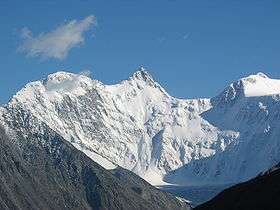Belukha Mountain
| Belukha Mountain | |
|---|---|
 Belukha, summer 2001 | |
| Highest point | |
| Elevation | 4,506 m (14,783 ft) [1] |
| Prominence |
3,343 m (10,968 ft) [1] Ranked 58th |
| Listing | Ultra |
| Coordinates | 49°48′27″N 86°35′24″E / 49.80750°N 86.59000°ECoordinates: 49°48′27″N 86°35′24″E / 49.80750°N 86.59000°E [1] |
| Geography | |
 Belukha Mountain Location in Kazakhstan, on the border with Russia | |
| Location | Kazakhstan–Russia border |
| Parent range | Altai Mountains |
| Climbing | |
| First ascent | 1914 by B.V. Tronov & M.V. Tronov |
| Easiest route | basic rock/snow climb |
Belukha Mountain (Russian: Белуха, lit "whitey"; Altai: Muztau or Üç Sümer), located in the Katun Mountains, is the highest peak of the Altai Mountains in Russia.[2] It is part of the World Heritage Site entitled Golden Mountains of Altai.[3]
Belukha is a three-peaked mountain massif that rises along the border of Russia and Kazakhstan, just a few tens of miles north of the point where this border meets with the border of China. There are several small glaciers on the mountain, including Belukha Glacier. Of the two peaks, the eastern peak (4,506 m, 14,784 ft.) is higher than the western peak (4,440 m, 14,567 ft.).
Belukha was first climbed in 1914 by the Tronov brothers. Most ascents of the eastern peak follow the same southern route as that taken in the first ascent. Though the Altai is lower in elevation than other Asian mountain groups, it is very remote, and much time and planning are required for its approach.
Belukha Glacier
A team of scientists, traveled to this remote glacier in the summer of 2001 to assess the feasibility of studying the glacier and extracting ice cores at the site. A Swiss-Russian team also worked on the glacier in 2001. Research was carried out from 2001 to 2003; glaciological observations were made, and both shallow cores and cores to bedrock were extracted and analyzed (Olivier and others, 2003; Fujita and others, 2004). Based on tritium analysis to date, the deeper cores may contain as much as 3–5,000 years of climatic and environmental records.[4]
Arrival
If traveling independently without using an agency, since 2008 it is required to apply for a special border zone permit in order to be allowed into the area. Foreigners should apply for the permit to regional FSB border guard office two months before the planned date[5][6]
See also
References
![]() This article incorporates public domain material from websites or documents of the United States Geological Survey.
This article incorporates public domain material from websites or documents of the United States Geological Survey.
- 1 2 3 "The Central Asian Republics Ultra Prominence Page" Listed as "Gora Belukha" on Peaklist.org. Retrieved 2011-11-20.
- ↑ "Mount Belukha". Encyclopædia Britannica. Retrieved 2007-07-31.
- ↑ "Golden Mountains of Altai". UNESCO. Archived from the original on 18 August 2007. Retrieved 2007-07-31.
- ↑ L. DeWayne Cecil, David L. Naftz, Paul F. Schuster, David D. Susong, and Jaromy R. Green. "Glaciers of Asia— THE PALEOENVIRONMENTAL RECORD PRESERVED IN MIDDLE LATITUDE, HIGH-MOUNTAIN GLACIERS—AN OVERVIEW OF THE U.S. GEOLOGICAL SURVEY EXPERIENCE IN CENTRAL ASIA AND THE UNITED STATES" (PDF). US Geological Survey (public domain). Retrieved 2012-05-13.
- ↑ http://www.lonelyplanet.com/thorntree/thread.jspa?threadID=1761406&tstart=0
- ↑ http://dontmind.freeshell.org/trekking/altai/#permit
| Wikimedia Commons has media related to Belukha Mountain. |